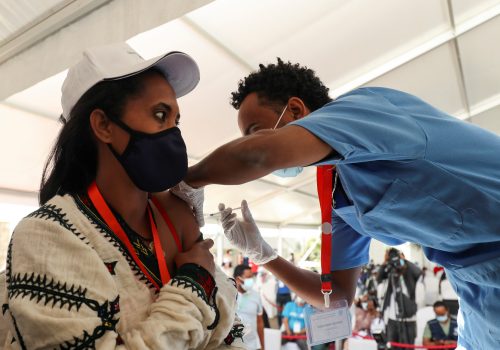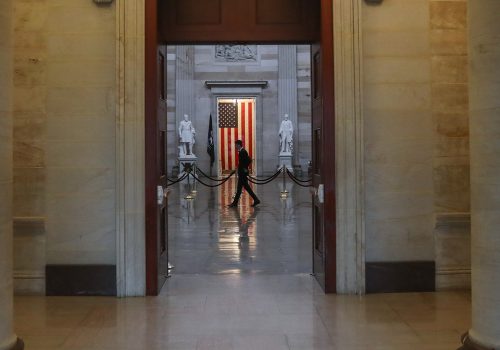The future is here: A guide to the post-COVID world 04/23/2021
Welcome to your guide to where the world is headed during the pandemic era and beyond, from Andrew Marshall. Each week, we’ll bring you the latest and most significant expert insights and international news about how coronavirus is reshaping international affairs. To stay updated each week, sign up to the newsletter here.
Let’s take a spin around the globe, in seven minutes or less.
In top stories this week:
- A “double mutant” virus is emerging in India as the country faces its biggest wave yet.
- Carbon emissions fell in the beginning of the pandemic; but is it what climate experts had hoped?
- How NATO’s approach to COVID-19 could inspire its climate-change response.
- But first…
The big story
This week’s key theme: Independent bookstores are having a moment.
It’s Independent Bookstore Day in the United States this Saturday, April 24. And independent bookstores, which have worked hard to establish local relationships, may now be well-placed to thrive, with a unique combination of new digital smarts and long-established communities.
“Independent Bookstore Day is always our busiest day of the year…” says Seth Marko, co-owner of The Book Catapult in the South Park neighborhood of San Diego, California. “It’s kind of like a national party day for independent bookstores and drawing awareness to all of us which is great.”
This year, bookstores are trying to find ways to mark the day in COVID-safe ways. The organizing committee for Seattle Independent Bookstore Day designed a 10-10-10 Challenge, which encourages customers to visit ten participating bookstores in ten days—either virtually or in-person—and make ten purchases. Meanwhile, Semicolon Bookstore in Chicago will be hosting its monthly #ClearTheShelves initiative, a book giveaway for students of Chicago Public Schools.
Last year was very good for book sales—print sales rose by 8.2 percent in 2020 in the United States, according to NPD Bookscan, the largest year-to-year increase in a decade. It was led by books to keep kids occupied (Big Preschool Workbook sold nearly 790,000 copies) but also to keep them happy (Dav Pilkey’s Dog Man: Grime and Punishment sold more than 1.2 million copies).
“Sales growth came in waves, from the sudden need to educate kids at home, to the super-heated political cycle,” said NPD Books analyst Kristen McLean. “All of the additional time people spent at home created a big appetite for reading, including huge spikes in sales of cookbooks and do-it-yourself books, which helped people stay entertained and engaged.”
But those sales were mostly online, with Amazon the main beneficiary. Independent booksellers and neighborhood bookshops saw their sales dip according to the American Booksellers Association, while curbside pickup and mail delivery brought new challenges.
The big lesson: Indie bookstores had to go digital—quickly—and that proved painful. Some bookstores’ point-of-sale systems and inventory systems were not connected to their websites. Few had prioritized digital systems.
Yet the bottom line is that they went into the pandemic as physical businesses and emerged as digital veterans. “Pre-pandemic, our website accounted for 2 percent of our business, but overnight it quickly became our lifeline,” says Flyleaf Books of Chapel Hill, North Carolina. “A year later, it still accounts for nearly half of our sales.”
One possible highlight: a new venture called Bookshop, operating in the United States and the United Kingdom, which aggregates online sales for independent bookshops. Amazingly, it had just launched in January 2020 as a rival to Amazon and proved a lifesaver for many. Bookshop sold $51 million worth of books in 2020 and has about 1,027 stores on the platform. It’s an interesting experiment, though a small part of the overall industry.
The last decade had been a year of growth for independent bookstores, and their role had been critical in helping anchor or revive local retail. The American Booksellers Association has talked about “a national resurgence for independent bookstores.”
“Independent bookstores provide a story of hope for community-led businesses,” wrote Ryan Raffaelli, associate professor in the Organizational Behavior Unit at Harvard Business School. He added that “Independent bookstores won customers back from Amazon and other big box players by stressing a strong connection to local community values.” They curated their inventory and promoted their stores as “intellectual centers for convening customers with likeminded interests—offering lectures, book signings, game nights, children’s story times, young adult reading groups, even birthday parties.”
Can they now return to that role—as well as build on their newfound digital successes? If they can pull off both digital scale and physical community, that would be a small miracle. As lockdown came to an end in the United Kingdom, the first place many people went was not the pub, but their much-loved local bookstore. “All our best regulars came in within the first couple of hours and it was pretty emotional to see the space being used for browsing books again,” said Jo Heygate, manager at Pages of Hackney, a bookstore in East London. This weekend, many across America will be experiencing that same emotion.
Subscribe to The future is here: A guide to the post-COVID world
Sign up for a weekly roundup of top expert insights and international news about how coronavirus is reshaping international affairs.

The world in brief
Insights from across the planet, in ten bullets or fewer
- There’s a threat of a “double mutant” variant in India. Prime Minister Narendra Modi said that India faces a coronavirus “storm,” as a million new cases in four days shook the nation’s health system. And a new coronavirus variant has been detected in the country, described as a “double mutant.” The WHO’s technical lead Maria Van Kerkhove said, “Having two of these mutations, which have been seen in other variants around the world, is concerning because there’s a similarity in these mutations which confer increased transmissibility.” Several countries have put in place restrictions on people traveling to and from India to slow the spread.
- A vaccine factory got a poor report. The facility in Baltimore, which ruined millions of doses of the Johnson & Johnson one-shot vaccine, had multiple problems with hygiene, maintenance, waste handling, and other violations, the US Food and Drug Administration said. Emergent BioSolutions was asked to stop producing materials for COVID-19 vaccines earlier this month. Johnson & Johnson said in a statement that it had increased “its oversight of drug substance manufacturing at the Emergent BioSolutions Bayview facility, including additional controls and personnel, to ensure the quality standards of our company and the [FDA] are met.”
- Carbon emissions are set to surge. Carbon dioxide emissions will soar this year as the global economy recovers, the International Energy Agency warned. COVID-19 cut carbon emissions, but by less than had been hoped, said a study in the journal Nature. “The decline is significant—roughly double Japan’s yearly emissions—but smaller than many climate researchers expected given the scale of the pandemic, and is not expected to last once the virus is brought under control.” The United States saw the biggest fall in emissions, nearly 13 percent; aviation was the most affected sector.
- The French are told to put their pens down. A leading French publisher, Gallimard, has tried to put a stop to the flood of new manuscripts produced by COVID-era writers. “Given the exceptional circumstances, we ask you to defer sending your manuscripts. Take care of yourselves and happy reading,” it said. Before the pandemic, Gallimard received thirty manuscripts a day, but that has almost doubled to fifty, said France 24. A poll indicated that more than five million French people began a writing project during lockdown.
The inside scoop
Insights from the Atlantic Council
Andrew Marshall is the Vice President of Communications for the Atlantic Council. He leads the Council’s media, digital, and editorial efforts, and coordinates the way the Council talks with its key communities.



